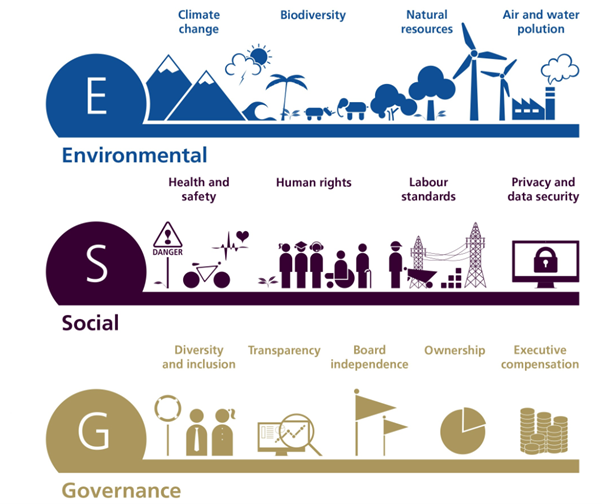The current definition of sustainability in the Oxford English Dictionary is “The property of being environmentally sustainable; the degree to which a process or enterprise is able to be maintained or continued while avoiding the longterm depletion of natural resources”.¹
But what does this mean when you see it mentioned in relation to investments? Well, to answer that we have to look at what sustainability relates to and with all of the major events that took place in 2020 it is difficult to find any main story that was not in some way linked to sustainable issues.
It is easy to consider how these factors impact on our daily lives, but how do we then invest into markets that will benefit from these advancements and shift in focus? The answer lies within three letters:
E – Environmental
S – Social
G – Governance
ESG summarises the non-financial factors that can be incorporated into the valuation of a business, or into an investment process. Using ESG analysis alongside financial analysis is a more holistic way of assessing risk and opportunities. Within ESG, there are many individual metrics or data points, examples of which are shown below:

Sustainable Investing
Sustainable investing is a broad overarching term, incorporating both ESG analysis to understand the operational sustainability of a company, and analysis to assess the positive contribution the business makes through the goods and services it produces.
Did you know...
Taking Flight: 968kg
Flying from London to New York and back generates about 968kg of CO2. In countries such as Burundi and Paraguay the average person emits less CO2 in a whole year.
Forest and Trees: 178m
The world’s forest area has decreased by an estimated 178m hectares since 1990 – that is roughly the size of Libya²
Disappearing Ice: 600bn tonnes
Greenland lost 600bn tonnes of ice in 2019 alone more than double the Island’s average losses between 2002 and 2019.
12 Years
A UN report in 2018 warned that we have just 12 years to avert a “potential climate disaster” when temperatures would rise beyond 1.5C.³
Global Heating
Average UK temperatures have risen by 1C over the past century. In July 2019 the UK recorded its highest ever temperature of 38.7C
Job Creation
The UK government’s plan for a “green industrial revolution” forecasts the creation of 250,000 jobs in industries including offshore, nuclear, and electric vehicle manufacture.
Global Policymakers’ commitments:
The new US President looks to deliver altogether more ambitious and detailed climate goals for the US, one of the greatest emitters of carbon dioxide. Biden hopes to commit the US to becoming carbon neutral by 2050, and for the economy to be both more resilient and more sustainable. In President Joe Biden’s first day in office, he signed the US back into the Paris Agreement, although this is likely to be the easy bit.
To deliver his carbon neutral ambitions, Biden is targeting $2 trillion of infrastructure. If approved, the spending will be focused across a range of sectors:
- Infrastructure
- Transit
- Power sector
- Buildings
- Innovation
- Agriculture and conservation
Biden is also planning the creation of a new Advanced Research Projects Agency for Climate; this new crossagency looks to target affordable, game-changing technology to get the US to their 100% clean energy target.
Similarly, China is planning for carbon neutrality by 2060, which will mean reducing carbon emissions by as much as 90% and offsetting the rest through natural systems or through technology that absorbs carbon. Whilst China is the world’s largest producer of carbon, the country is also by far the largest investor, producer and consumer of renewable energy.
Meanwhile, a couple of weeks ago, Putin formally ordered the Russian government to cut Greenhouse Gases by 30% by 2030, from 1990 levels. Whilst Russia is economically dependent on fossil fuels – with energy being the country’s largest export – climate change is a threat to Russia. 65% of Russia’s landmass is the Arctic, representing 10% of Russia’s GDP, according to The Arctic Institute.
We had the positive news on successful Vaccines being approved:
For most of us 2020 has been a year we would rather forget and write off. It has brought about devastation for many and disruption for all. Our lives have been put on hold for almost a year, whilst governments and the healthcare industry worked together to contain COVID-19 and invent a vaccine. No government seemed to have the secret ingredient for pandemic prevention, but through unprecedented collaboration between pharmaceutical businesses, universities and International organisations, by mid-November three vaccines were being prepared for distribution.
Collaboration of these international organisations have seen the production and approval take place at a speed never before known and this is all possible because of the advancements of new world methods and technology.
The knowledge and advancements made in these sectors will not only benefit our quest to rid populations of this terrible virus, but also provide a sense of what is achievable when technology and pharmaceuticals work together for a common cause.
The developments brought about by this urgent need will create opportunities in these sectors for many other applications.
In a future article we will be discussing the reasons why you should consider sustainable investing, however if you would like any further information on this topic please do not hesitate to get in touch with one of our advisers today on 0117 450 1300.
1 Oxford English Dictionary
2 Food and Agriculture Organization of the United Nations 26 January 2021
(www.fao.org/news/story/en/item/1298907/icode/)
3 Intergovernmental Panel on Climate Change, 26 January 2021 (https://www.ipcc.ch/sr15/)







